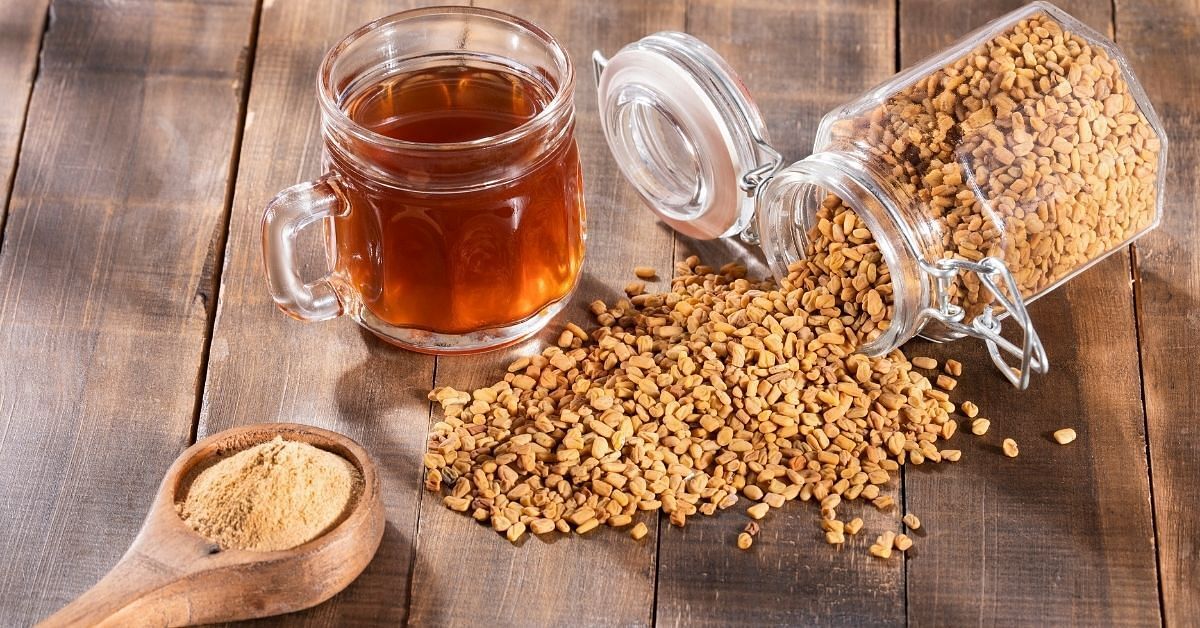18 Effective Methi (Fenugreek) Water Benefits Science Backed ~ Science Backed

Fenugreek or methi seeds are used in Indian cooking as a spice to boost the flavour and aroma of different foods. But apart from being a kitchen staple, there are numerous health benefits of fenugreek seeds soaked in water.

Nutritional Value of Methi (Fenugreek Seeds)
One spoon of fenugreek seeds contains:
- 3 grams of proteins
- 6 grams of carbs
- 7% of the daily value of manganese
- 1 gram of fat
- 20% of the daily value of iron
- 3 grams of fibre
- 5% of the daily value of magnesium
Besides these, they also contain vitamins A, C, B, thiamin, riboflavin, and niacin. In addition, the seeds include a variety of phytochemical components, including alkaloids, flavonoids, and phenolics.
Methi Water Benefits
Here are some methi water benefits. They will guide you in understanding the uses of fenugreek water and why you should include it in your daily diet:
1. Regulates Blood Sugar
Methi water benefits your health by regulating your blood sugar levels. In addition, it may assist in the treatment of insulin resistance by improving insulin sensitivity and responsiveness. As a result, individuals with diabetes are benefited from using it.
2. Improves Metabolism
Fenugreek water helps in speeding up your metabolism and increasing the body's heat.
3. Boosts Hydration
Drinking fenugreek water benefits you by helping you handle exhaustion, nausea, and headaches.
4. Enhances Sexual Health
The water improves sexual health by boosting testosterone and sperm count.
5. Detoxifies Blood
Methi water cleanses the blood and has a positive impact on blood cleansing.
6. Helps in Detoxification
Methi’s vital diaphoretic function aids in sweating, which helps with the body’s detoxification.
7. Soothes Respiratory Ailments
Methi water can help with sore throat, colds, coughs, and fevers.
8. Regulates Acid Levels
People with acidity issues can consume soaked fenugreek seeds on an empty stomach. Lowering acidity and improving digestion are the added benefits of fenugreek seeds soaked in water.
9. Improves Gut Health
Methi water benefits gut health by helping with indigestion, constipation, and other digestive issues. Fenugreek contains galactomannan, a soluble fibre. This encourages the digestive tract to expand, resulting in a feeling of fullness. As a result, it helps to reduce excessive hunger, having a weight-controlling effect as well.
10. Aids in Weight Loss
Drinking methi water reduces daily fat consumption. You can take methi water for weight loss management.
11. Comes with Antiseptic Properties
Fenugreek water is a powerful antiseptic. Its regular intake may help to improve the digestive system and reduce gastritis symptoms. It's best to drink it throughout the cooler months. Fenugreek water treats symptoms such as bloating and water retention.
12. Works as a Galactagogue
Fenugreek seeds are perfect for lactating or nursing women to boost their breast milk production.

13. Removes Toxins
Fenugreek water assists in the removal of harmful toxins from the body and the improvement of bowel movements.
14. Reduces Kidney Stones
Fenugreek water is helpful in the treatment of kidney stones as it reduces the calcification in the kidney tissues.
15. Boosts Heart Health
Methi water contains natural soluble fibre, which is beneficial for the heart. They guard against heart attacks. In addition, it helps to prevent abnormal blood clotting, which causes heart attacks and strokes. Those suffering from high cholesterol should try soaking fenugreek seeds to reduce their cholesterol levels.
16. Has Analgesic Properties
Fenugreek possesses anti-inflammatory and analgesic properties, which help women manage the menstrual cycle pain. In addition, it is beneficial in reducing menopausal symptoms.
17. Enhances Hair Health
Drinking fenugreek water for hair growth increases hair volume and prevents dandruff and roughness.

18. Improves Skin Health
Fenugreek water prevents acne and a variety of other skin concerns, including fine lines, dark spots, and wrinkles.
How to Make Methi Water?
You can soak methi seeds in water because it contains water-soluble minerals and fibre.
Wondering how to make methi water? It is very simple!
- Soak fenugreek or methi seeds overnight in a glass of boiling water and cover it using the lid.
- Do this before going to bed.
- Allow the seeds to soak for the entire night.
- The following day, strain the methi seeds.
You can also make methi water by mixing methi or fenugreek powder in boiling water.
- For this, you first need to roast the fenugreek seeds in a pan.
- Roast until you get the aroma of the seeds.
- Switch off the flame and cool the seeds.
- Powder the seeds in a blender without any water.
- Now, use this fresh fenugreek powder every morning to make your methi water.
- Take 1 teaspoon of the powder and mix it in warm water. Your methi water is ready!

How to Drink Methi Water?
If you are wondering how to drink methi water, here are the two most simple ways:
1. Honey & Methi Drink
In a glass of boiling water, soak one teaspoon of fenugreek seeds for around 10 minutes. Strain and season it with a pinch of honey and a squeeze of lemon. You can also choose overnight soaked fenugreek water to prepare the drink.
2. Fenugreek Tea
Crush the fenugreek seeds with some water until a delicate paste forms using a blender or processor. In a pan, boil the water and dissolve the paste. For extra flavour, add ginger or cinnamon. Lower the flame and allow the tea to boil for 5 minutes. You can now enjoy your cup of hot methi tea. Consume the drink on an empty stomach.
Methi Water Side Effects
Methi water side effects can present under certain circumstances, as described below:
- If you are pregnant, don't consume methi water as its seeds can cause abnormalities in the baby and early labour in pregnant women.
- Since methi water reacts with oestrogen, it is unsafe for women having hormone-sensitive cancers.
- When the uses of fenugreek water exceed the prescribed limits, it can cause stomach discomfort, diarrhoea, headaches, dizziness, bloating, and gas.
- It can cause seasonal allergies, facial puffiness, coughing, wheezing, and severe allergic responses in sensitive people.
- In those with diabetes, excessive methi seeds intake can cause blood glucose to drop to dangerously low levels.
- Individuals with low blood pressure should not consume methi water.
- The water might cause redness and irritation in children.
Summing Up on Methi Water Benefits
Methi water benefits everyone by promoting weight loss and helps boost your liver and kidney health. Fenugreek helps control blood sugar levels, enhances breast milk production, aids digestion, and eases menstrual cramps. The antioxidant properties of methi water detoxify your system and promote skin health and hair growth. Drink methi seeds soaked in water or boil fenugreek powder to make the most of the wonderful methi tea. You can add flavour by mixing honey or lemon to the tea.
Avoid drinking methi water if you are pregnant. Start your day with a glass of fenugreek water to boost your metabolism and improve nutrient intake. If you are a sensitive person with severe allergies, consult your physician before taking fenugreek seeds in water.
FAQs
Can We Drink Methi Water Daily?
Yes, you can drink methi water daily. It helps flush out all the toxins and improves your gut health. However, if you are pregnant, avoid taking methi water.
Is Methi Water Good for Thyroid?
No, methi water is known to interact with the thyroid gland. If you are on any medication for your thyroid disorder, fenugreek can cause further complications. Consult your physician before you consume methi water for your thyroid issues.
Is Methi Water Good for PCOS?
Yes, methi water is good for PCOS as it helps with insulin resistance. Methi helps regulate your blood sugar levels and improves your body’s insulin sensitivity. This helps manage the symptoms of PCOS like weight gain and insulin resistance.
References
- Florence Galtier, Eric Renard, Pierre Petit, December 2009; A fenugreek seed extract selectively reduces spontaneous fat consumption in healthy volunteers - https://pubmed.ncbi.nlm.nih.gov/19809809/
- Anita Kochhar, Malkit Nagi, December 2005; Effect of supplementation of traditional medicinal plants on blood glucose in non-insulin-dependent diabetics: a pilot study - https://pubmed.ncbi.nlm.nih.gov/16379570/
- Darryn Willoughby, Richard Kreider, December 2010; Effects of a purported aromatase and 5α-reductase inhibitor on hormone profiles in college-age men - https://pubmed.ncbi.nlm.nih.gov/21116018/
- Ethan Basch, Catherine Ulbricht, Grace Kuo, February 2003; Therapeutic applications of fenugreek - https://pubmed.ncbi.nlm.nih.gov/12611558/

